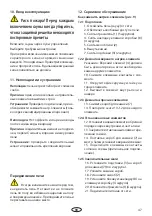
34
EN
For the installation of sauna heaters, please
pay attention to the DIN VDE 0100 part 703 or
the corresponding national norms and legal
requirements, e.g. UL875 norm!
This standard makes the following statement
valid in your newest expenditure, since Febru-
ary 2006, paragraph 703.412.05; Quotation:
The addition must be planned for all electric cir-
cuits of the Sauna by one or more fault current
protection device (RCDs) with a calculation differ-
ence stream not more largely than 30 mA, exclud-
ed of it is Sauna heating.
The EN 60335-1 DIN (VDE 0700 part 1):2012-10
states the following in paragraph 13.2; quote:
The leakage current may not exceed the following
values during operation:
- for stationary heaters of protection class I 0,75
mA; or 0,75 mA each kW input of the appliance,
depending on the higher value, at a maximum
value of 5 mA.
If the appliance is equipped with a protective
device for leakage current (ELCB), please pay at-
tention to the fact that no other electrical units
will be protected by this ELCB.
Under current manufacturing technology, it is
not reasonable to use heating elements for sau-
na heaters which do not collect moisture from
the surrounding air. It is therefore possible that
a little bit of moisture from the surrounding air
may reach the magnesium-oxide filling in the
heating elements during transport or storage
and may cause the ELCB to release.
In this case the heater must be heated up un-
der supervision of an expert, during which
the Ground conductor is not connected. After
about 10 minutes, when moisture has evapo-
rated from the heating elements, the heater
must be reconnected to the Ground conductor!
If the sauna heater is not in use for a significant
period of time, we recommend running it every
6 weeks, so as to avoid moisture concentrating
in the heating elements.
Therefore, should the ELCB be released dur-
ing start-up, the electrical installation must be
checked.
Installation of the sauna heater and control unit
must be undertaken only by an authorized and
appropriated qualified electrician.
Without a documented proof of such installa-
tion a warranty is generally void.
















































